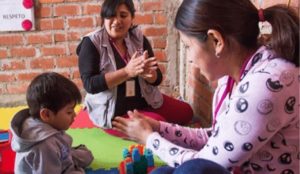Back in 2015, a vision of the Sustainable Development Goals was a world in which every child could survive and thrive. Worldwide, over 250 million children worldwide are at risk of not achieving their full developmental potential. While improving survival rates is, of course, still very much on the global agenda for newborns and children, reframing our focus to incorporate ‘thrival’ will not only to save lives now, but will help build brains for a happy and healthy future.
Of course, there are already evidence-based programmes and interventions across the globe with this very aim in mind. However, to really achieve the vision set out in 2015, we need to move beyond small-scale interventions delivered to the tens, hundreds or thousands towards scaled-up programmes for millions of babies, parents and caregivers.
In 2018, the WHO, UNICEF and World Bank published the Nurturing Care Framework, which gives a policy roadmap towards this vision. However, there remains a gap in the literature for evidence-based, practical guidance on how to design and implement equitable, sustainable and effective early child development programmes, across varying contexts and particularly in low- and middle-income countries.
This series of 5 papers, coordinated by the London School of Hygiene & Tropical Medicine with more than 30 authors from over 20 institutions, aims to provide guidance to policymakers, programmers and researchers who are asking ‘how to’ – how to design, how to implement, how to monitor and evaluate, and how to pay. The series builds on the evaluation of the Grand Challenges Canada® Saving Brains® portfolio and additional analyses to provide a step-by-step programme cycle of key decisions for scaling up implementation, as well as actions for health professionals, researchers, and policymakers in the journey towards achieving the vision set out in 2015.
“Health professionals play a crucial role – not just at the clinical interface but as champions for wider scale-up of policies and interventions that support early child development”[1]
All papers are available online from Archives of Disease in Childhood.

Victoria Ponce Hardy, London School of Hygiene and Tropical Medicine
[1] Banerjee A, et al. Reaching the dream of optimal development for every child, everywhere: what do we know about ‘how to’? Arch Dis Child. April 2019, Vol 104, S1.
Dissemination materials, including presentation slides, are available for download here.